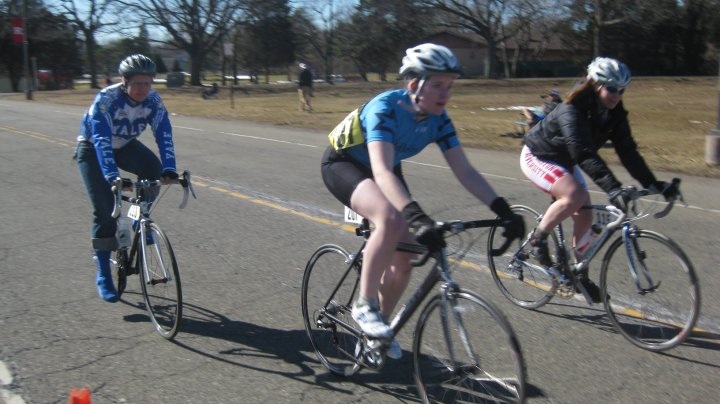My collegiate cycling career began when I bought my first road bike at an outdoors store in Burlington, Vermont…in the middle of February. I did a few unsteady laps in the parking lot before packing my new baby in the back of a friend’s Subaru and driving home to wait for spring. It snowed the rest of the weekend and for much of the next two weeks, but even though I’d barely ridden on skinny tires, my friends on the Middlebury cycling team had already convinced me to sign up to race in the season opener for the Eastern Collegiate Cycling Conference (ECCC). I had no idea what I was getting myself into, but with a borrowed jersey and about five miles under my belt, I headed down to New Jersey to race at Rutgers University.
Collegiate cycling falls under the guidance of USA Cycling, the organization committed to developing competitive cycling in the United States. While the ECCC hosts bike races across New England and the mid-Atlantic, the group’s main goal is getting more people on bikes and having a great time while doing it. Like all USA Cycling races, there are categories for different levels of riders, but the ECCC takes racing a step further by offering an intro category for riders who have never raced before. Older, more experienced riders offer pre-race clinics to teach bike handling skills like cornering and to work on pack riding, something that’s pretty scary for most new racers. The race itself features a coached component where the same older racers ride alongside the group to make sure everyone is fairly comfortable before letting the pack loose for a short race.
I rolled up to the starting line still not quite knowing what to expect. The only bike racing I’d ever encountered was watching the Tour de France on TV…not exactly what I had in mind for my first time. The race was set up as a criterium, a “crit” for short. Riders line up together to take off for a set amount of racing time (anywhere from 30 to 90 minutes) on a closed circuit course about a mile long. The group sets its own pace, which the race officials calculate after a few laps and use to determine the number of laps remaining in the race. A sign placed at the start line counts down the remaining laps so that riders know when to sprint for primes, laps during the race where the winner for that time around gets a prize, and for the finish.
Great crit racing combines a high fitness level with strategic thinking and top technical skills. Yikes. I had managed to stay in shape thanks to training all winter with my friends on the crew team, but my understanding of strategy was minimal (you just go really fast, right?) and my only technical skill was my hyper-tuned braking reflex. I started out slowly, gripping the handlebars in fear, too afraid to look down and figure out how to clip in to my right pedal. By the middle of the first lap I was about a hundred yards behind the pack and didn’t think I’d be able to catch up. My heart rate soared as I pedaled wildly, not daring to take my eyes off the road or hands off the brakes. Fortunately, one of the coaches from the clinic, a grad student at Boston University who raced in the top category, pulled up beside me and talked me through taking a deep breath, slightly loosening the death grip I had on my bar tape, looking down for long enough to clip in, then building up speed to catch up to the rest of the racers.
I never caught up to the main pack, but I passed a few girls before the race ended. Afterward we spent some time talking about how we’d all just started cycling and we agreed that the intro coaches had been a huge help in making racing accessible and fun, too. It took me the rest of the season to get good at using clipless pedals and many miles of riding through the Vermont countryside to get comfortable on my bike, but I knew I was going to keep racing as much as possible in the future. I love riding my bike, and collegiate racing has provided me with a new network of friends (and friendly rivalries) along with the chance to develop my fitness and competitive skills.
ECCC intro races are open to women of all ages who’d like to try racing. The 2012 road season schedule will be on their website by the end of 2011. Check out this link for more information: ECCC Women





Leave a Reply